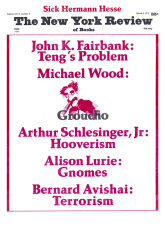Jaunty, wry, rueful. Flash of kingfisher blue eyes. Edmund Wilson liked to say there was something French about him. A person of courage and irony. Much self-irony. Voice ironical with a sort of slide in it. Wrote particularly well about elegant, dandyish writers—James, Nabokov, Malraux—if anyone as elephantine as James can be thought of as a dandy or fop. He himself had a quality of elegance, but mixed, very appealingly, with innocence, the Joliet, Illinois, of his youth. Though he had the normal quota of parents, there was a sense of the orphan about him—he and his sister as two orphans in the big wide world. Was always like the boyish hero of a Bildungsroman.
Unsuitable, often comic things were always happening to him, as when he worked as an organizer for the CP on the waterfront while being literary editor of the New Masses. Or his being on the protective picket line for the students at Columbia in 1968, the day he got a new and expensive set of the finest porcelain teeth—example of rueful courage, since he expected to be hit by a night stick. On that occasion he stood up against his respectable friends of the faculty. Wrote about it—including the teeth, I think—for The New York Review.
There was something permanently subversive about him, and he was attracted to the modern literature he taught so well—Proust, Joyce, Mann, Kafka, etc.—by the sense that it was subversive of established values and forms. Yet he was never a bohemian; he was too much attracted to style for that. Hence he was continually finding himself in incongruous positions. He was a lightning rod for the absurd and the incongruous. Or you could say that the dryness of his mind—he was very intelligent—accorded strangely with a wild streak in him, with curiosity and with an impressionable soul.
It was through him I came to Bard College to teach, and I think he was more at home at a place like Bard than he was later at Columbia—for one thing Bard was more amusing, more incorrigible, like himself. Yet he was not, and never could have been, a cult figure. In his own way, he was an upholder of order and legitimacy, or, let’s say, a wry sympathizer with their efforts to stay in place. Not vain, unprejudiced, fair-minded.
This Issue
March 8, 1979



